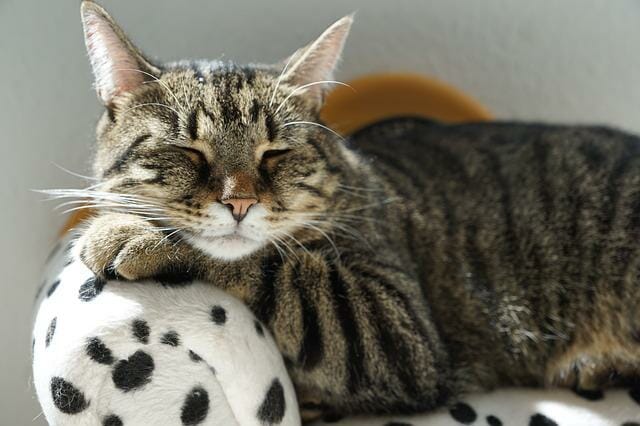Why Does My Cat Keep Throwing Up: Reasons Why Cats Throw Up and How to Deal With It
Hairballs are a common reason why cats may vomit. When cats groom themselves by licking their fur, they ingest some hair. This hair can accumulate in their stomach and form a ball-like shape, which can cause discomfort and vomiting. To prevent hairballs, it’s important to groom your cat regularly to remove loose hair before it can ingest it.
Table of Contents
Reasons Why Cats Are Throwing Up


Dietary Issues
Dietary issues can also cause cats to vomit. For example, some cats may have food sensitivities or allergies that can cause gastrointestinal upset, including vomiting. Additionally, cats may vomit if they eat too quickly or eat something that doesn’t agree with their digestive system.
To address dietary issues, it’s important to ensure that your cat eats a balanced and appropriate diet for their age, breed, and health status. For example, if you suspect your cat has a food sensitivity or allergy, you may need to try switching to a different type of food or a hypoallergenic diet. Making any dietary changes gradually is important to avoid causing further digestive upset.
Additionally, feeding your cat smaller, more frequent meals throughout the day can help prevent them from overeating or eating too fast, which can lead to vomiting. In addition, providing your cat with fresh, clean water is also important to ensure they stay hydrated and maintain good digestive health.
Ingesting Foreign Objects
Cats are curious creatures and may ingest foreign objects such as string, rubber bands, plastic, or other small items. This can lead to gastrointestinal blockage or irritation, which can cause vomiting.
If you suspect your cat has swallowed a foreign object, seeking veterinary care as soon as possible is important. Your veterinarian may recommend diagnostic tests, such as X-rays or an ultrasound, to determine the location and extent of the blockage. Treatment may include surgery to remove the foreign object or supportive care to help your cat pass it naturally.
Keeping small items out of their reach is important to prevent your cat from ingesting foreign objects. This may include keeping drawers and cabinets closed, securing loose cords and strings, and keeping household plants toxic to cats out of their reach. Additionally, providing your cat with plenty of toys and appropriate scratching surfaces can help prevent them from chewing on inappropriate items.
Medical Issues
Medical issues can also cause cats to vomit. Some common medical issues that can cause vomiting include kidney disease, liver disease, hyperthyroidism, diabetes, and gastrointestinal disorders.
If you suspect your cat may have a medical issue causing their vomiting, it’s important to take them to the vet for a check-up. Your vet may recommend diagnostic tests, such as blood work, urinalysis, and imaging studies, to determine the underlying cause of your cat’s vomiting. Treatment will depend on the underlying condition and may include medications, dietary changes, or other supportive care.
It’s important to monitor your cat’s vomiting and note any additional symptoms or changes in behavior. If you notice any other signs of illness, such as lethargy, decreased appetite, or changes in litter box habits, it’s important to seek veterinary care immediately. Early detection and treatment can help improve your cat’s prognosis and quality of life.
Stress or Anxiety


Stress or anxiety can also cause cats to vomit. For example, cats may experience stress or anxiety for various reasons, such as changes in their environment, the introduction of new pets or people, or separation from their owners. This stress can lead to gastrointestinal upset, including vomiting.
To address stress or anxiety-related vomiting, it’s important to identify and address the underlying cause of your cat’s stress. This may involve changing their environment, such as providing them with a quiet space to retreat to or introducing them to a pheromone diffuser to help them feel more relaxed. Additionally, providing your cat with plenty of playtimes, exercise, and mental stimulation can help reduce stress and anxiety.
If your cat continues to vomit despite efforts to reduce stress and anxiety, it’s important to seek veterinary care to rule out any underlying medical issues. Your vet may also recommend medications or other treatments to help reduce your cat’s stress and anxiety.
Parasites
Parasites can also cause cats to vomit. Common parasites that can affect cats include roundworms, tapeworms, and giardia. These parasites can cause gastrointestinal irritation, inflammation, and infection, leading to vomiting.
If you suspect your cat may have a parasite infection, it’s important to take them to the vet for a check-up. Your vet may recommend diagnostic tests, such as a fecal exam or blood test, to identify the type of parasite and determine the best course of treatment. Treatment may involve medications to kill the parasite and supportive care to help manage your cat’s symptoms.
To help prevent parasite infections, keeping your cat on a regular deworming schedule and practicing good hygiene are important. This may include regularly cleaning your cat’s litter box, washing your hands after handling your cat, and avoiding contact with other animals infected with parasites. Additionally, it’s important to keep your cat indoors to reduce its risk of exposure to parasites.
Medical Issues Related to Your Cat’s Throwing Up
- Gastrointestinal issues: Gastrointestinal problems such as inflammatory bowel disease, gastroenteritis, or gastrointestinal blockages can cause a cat to vomit.
- Kidney or liver disease: Kidney or liver disease can cause a buildup of toxins in the blood, leading to vomiting.
- Pancreatitis: Inflammation of the pancreas can cause vomiting and other digestive problems.
- Hyperthyroidism: Overactive thyroid glands can cause weight loss, vomiting, and other symptoms.
- Cancer: Certain types of cancer, such as lymphoma, can cause vomiting in cats, according to the VCA Animal Hospitals.
- Infections: Infections such as feline infectious peritonitis (FIP), feline leukemia virus (FeLV), or feline immunodeficiency virus (FIV) can cause vomiting.
- Allergies: Allergies to food, medication, or environmental factors can cause vomiting.
Things to Do When Your Cat Is Throwing Up
Remove Any Food or Water
If your cat is actively vomiting, removing any food or water to prevent further irritation to its stomach is important. Offering food or water while your cat is actively vomiting can increase their discomfort and may cause further vomiting. Once your cat has stopped vomiting for a few hours, you can offer small amounts of water to help prevent dehydration.
However, if your cat continues to vomit or shows signs of dehydration, such as dry gums, lethargy, or decreased skin elasticity, it’s important to contact your vet for guidance. Sometimes, your vet may recommend fluids or medications to help manage your cat’s vomiting and prevent dehydration.
Offer Small Amounts of Water


Once your cat has stopped vomiting for a few hours, you can offer small amounts of water to help prevent dehydration. It’s important to offer water in small amounts to avoid overwhelming your cat’s stomach and causing them to vomit again. You can offer water in a shallow bowl or use a syringe or dropper if your cat has difficulty drinking independently.
Consider offering your cat water with ice cubes or warming it slightly to make it more appealing. If your cat is not interested in drinking water, try offering them wet food, which helps provide additional hydration.
However, if your cat continues to vomit or shows signs of dehydration, such as dry gums, lethargy, or decreased skin elasticity, it’s important to contact your vet for guidance. Sometimes, your vet may recommend fluids or medications to help manage your cat’s vomiting and prevent dehydration.
Monitor Your Cat’s Behavior
If your cat is throwing up, monitoring its behavior and noting any changes is important. Monitor your cat’s appetite, thirst, energy level, and litter box habits. If your cat is lethargic, not eating or drinking, or shows changes in their litter box habits, these may be signs of a more serious underlying issue.
Additionally, seeking veterinary attention is important if your cat is throwing up frequently or is uncomfortable. Your vet can help determine the underlying cause of your cat’s vomiting and recommend the appropriate treatment.
